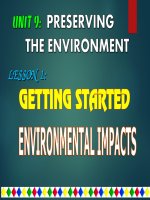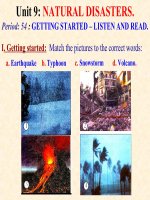- Trang chủ >>
- Đề thi >>
- Đề thi lớp 5
Unit 09 Preserving the Environment Lesson 1 Getting started
Bạn đang xem bản rút gọn của tài liệu. Xem và tải ngay bản đầy đủ của tài liệu tại đây (98.61 KB, 4 trang )
Preparing date: March 13th , 2018
Class: 10C9
Student Teacher: Vu Thi My Hanh
Teacher: Phạm Thi Lan Oanh
Teaching date: March 16 th, 2018
Period:
UNIT 9: PRESERVING THE ENVIRONMENT
Lesson 1: Getting started
I/ Objectives:
By the end of the lesson, students will be able to:
1. Knowledge: ( 3 basic levels: recognition, comprehension, application).
- Vocabulary: read, write, and understand key words or phrases related to
preserving the environment.
- Language: use structure, vocabulary to do activity required.
2. Skills: Use the skill(s) corresponding to each part of the lesson to do follow-up
activities.
3. Attitude:
- Have a positive attitude towards what they have learnt.
- Understand and actively respond to relevant matters or situations.
II/ Preparations:
- Teacher: Handouts, textbook, pieces of papers and powerpoint.
- Students: Textbook.
III/ Anticipated problems and solutions:
- Students may not be used to the way of skills and doing the activities.
- So prepare and explain carefully before T asks ing them to do.
IV/ Procedures:
TEACHERS AND STUDENTS’
ACTIVITIES
CONTENTS AND BOARD OR
SCREEN DISPLAY
1. Warm up (10 minutes)
* Brainstorming
-T asks ss to explain the word “environment”
(Our surroundings including land, soil, plants,
animals, air, water and humans)
ENVIRONMENT
-Raise some questions:
Is the environment important to humans?
What are humans doing to the environment?
-Elicit the answers from SS and lead in:
What do people have to do?
Preserve the environment
2. New lesson
PRESERVING THE ENVIRONMENT
- Introduce the topic of the lesson:
Lesson 1: GETTING STARTED
The environment is so important to humans.
So How is it important?
Activity 1: (10 minutes)
- T asks ss to look at the textbook (page
38), make sure that they know what to do.
- T tells the class that they are going to
listen to a conversation between Nam and
his father.
- T asks ss to predict the topic of the
conversation.
- T plays the recording for Ss to listen and
read the conversation at the same time.
(Remind Ss not to worry about the
unknown words or grammar points)
- T asks ss to tell about the general idea of
the conversation.
- Get feedback:
What’s Nam doing?
What are they talking about?
Activity 1. Listen and read
Expected answers:
Nam is writing a letter to give
some advice on environmental
preservation.
Nam and his father are talking
about environmental impacts.
Activity 2: Matching (7 minutes)
- T asks Ss to work in pairs to label the
photos.
- Allow 2 minutes for the pairs to look up the
words and phrases in a dictionary and
confirm their meaning.
- Check Ss’ answers as a class. Have Ss note
down the words in their notebooks.
- T has some new words.
- greenhouse effect(n): hiệu ứng nhà kính
- pollution(n): ô nhiễm
- deforestation(n): nạn phá rừng
- polar ice melting(n): tan băng cực
- fossil fuels(n): nhiên liệu hóa thạch
Activity 2:
Answers:
a. greenhouse effect
b. pollution
c. deforestation
d. polar ice melting
e. fossil fuels
*New words:
- greenhouse effect(n): hiệu ứng nhà kính
- pollution(n): ơ nhiễm
- deforestation(n): nạn phá rừng
- polar ice melting(n): tan băng cực
- fossil fuels(n): nhiên liệu hóa thạch
Activity 3. T asks and answer the
questions. (15 minutes)
– work in groups ( 4 groups)
- Make sure that Ss know what to do in this
part by asking: What are you going to do?
- T asks Ss to read the questions once and T
Activity 3:
Key:
1. He is writing a letter for the school
newsletter.
2. The editor asked Nam to write some
practical advice on environmental
asks if they need any explanation.
(Remind Ss that the answer to question
6 is not in the conversation)
- T asks Ss to work in groups to read and
give the answer to the questions through a
game “ Lucky number and unlucky
number”
- T checks and comments.
preservation.
3. It means the negative influence or
effect on the environment.
4. Because he thinks if we can see the
impacts on the natural environment, we
will know how to protect it.
5. They are deforestation, pollution,
global warming, fuel depletion, polar ice
melting and rise of sea levels.
6. Answers will vary. There are very
garbage.
3.Consolidation(3 minutes)
- T asks Ss: What have you learnt today?
What can you do now?
- Summarize the main points of the lesson
4.Homework( 1 minute)
Assign homework:
- T asks Ss to make the sentences with the
words/ phrases related to the topic of the
lesson.
- Do the Vocabulary exercises in Language
lesson (page 39)
Feedback:
.............................................................................................................................................
.............................................................................................................................................
.............................................................................................................................................
.............................................................................................................................................
.............................................................................................................................................
Tiên Lãng, ngày tháng năm 2018
Phê duyệt của giáo viên hướng dẫn
Người lập kế hoạch
Phạm Thị Lan Oanh
Vũ Thị Mỹ Hạnh









